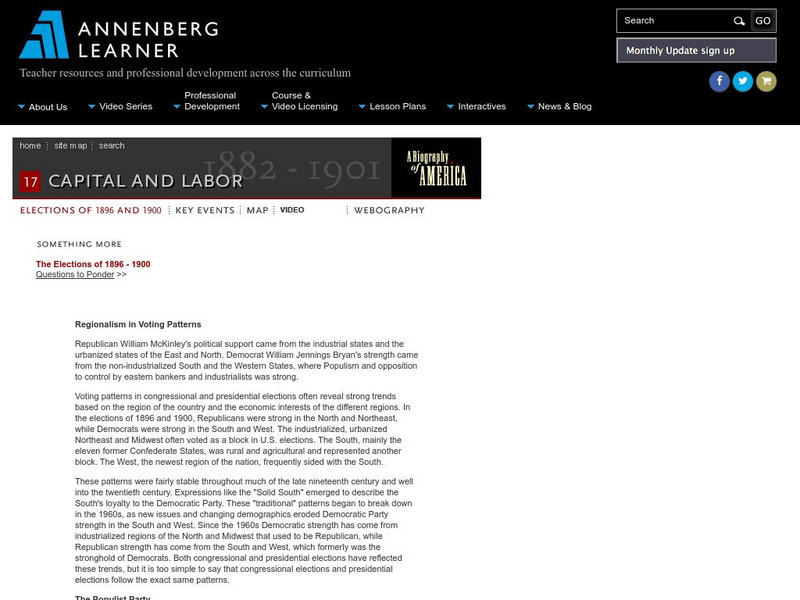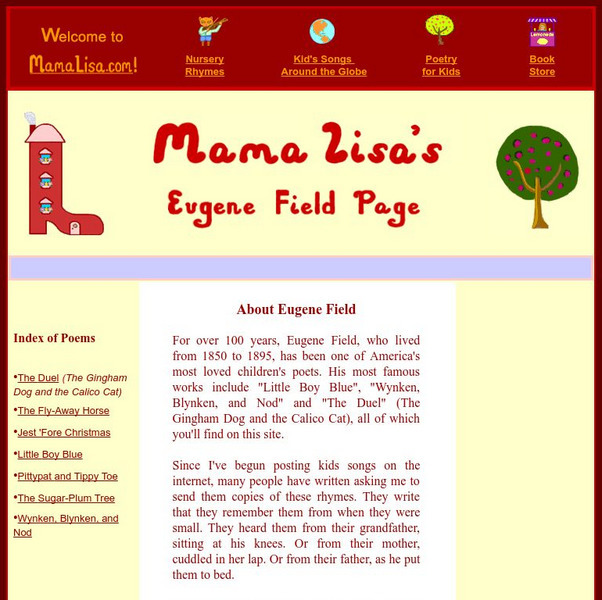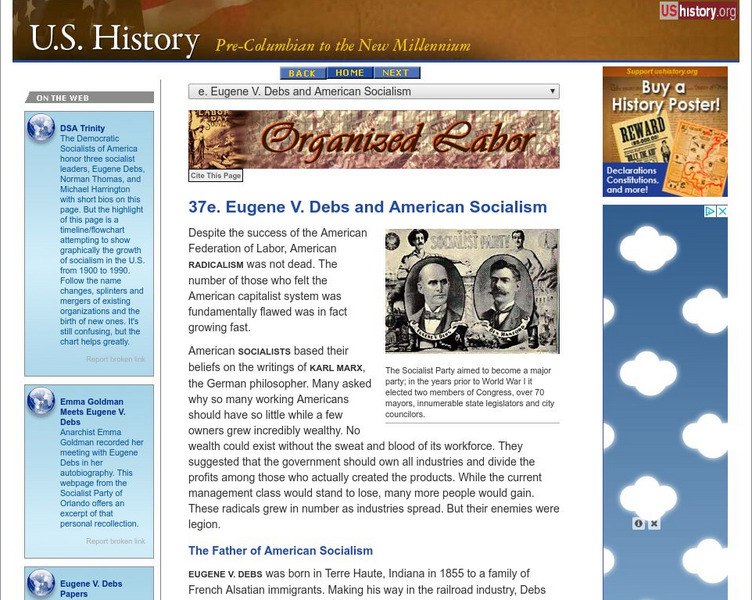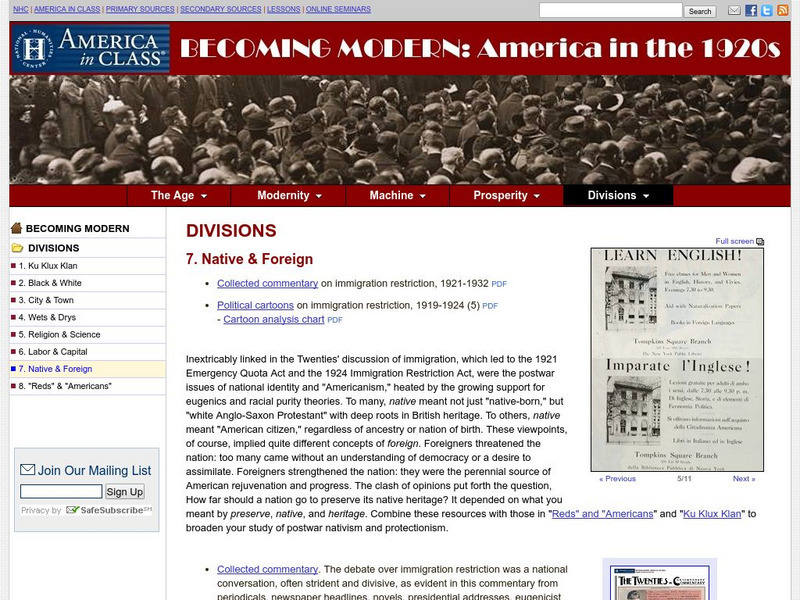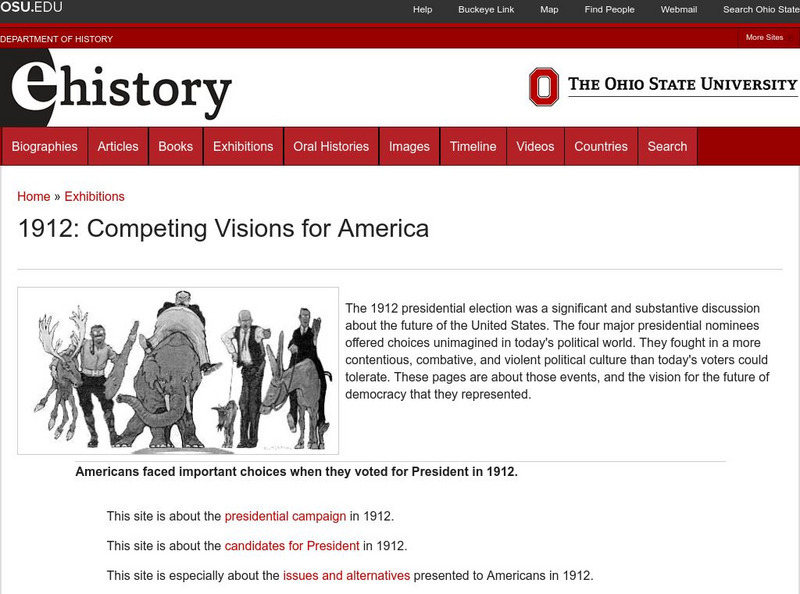National Humanities Center
Teaching The Great Gatsby: A Common Core Close Reading Seminar
The 41 slides in a professional development seminar model how to use close reading techniques to examine the many layers of F. Scott Fitzgerald's The Great Gatsby. In addition to passages from the novel, slides provide biographical...
Other
For Many, One: Eugenics in the Culture Wars of the 1920s
Read about the bizarre ideas of those who believed in the role of eugenics in society. Find out about "bad" heredity and "good" heredity and see the form from the Eugenics Society of America that determined the "fitness" of individual...
Annenberg Foundation
Annenberg Learner: A Biography of America: The Elections of 1896 1900
Read about all the factions involved in the campaign and election of 1896 and see how the Democratic Party was split, which resulted in the election of Republican William McKinley. The last part of this essay talks about the campaign of...
Other
Afl Cio: Eugene Victor Debs (1855 1926)
Debs began his association with labor issues at an early age starting with the Brotherhood of Locomotive Firemen. He went on to be active in the American Railway Union, the Socialist Party of America, and the Industrial Workers of the...
Siteseen
Siteseen: American Historama: Eugenics Movement in America
Interesting facts and information on the Eugenics Movement in America.
Other
Mama Lisa's Poetry Page: Eugene Field
For over 100 years, Eugene Field (1850 to 1895) has been one of America's most loved children's poets. His most famous works include "Little Boy Blue", "Wynken, Blynken, and Nod" and "The Duel" (The Gingham Dog and the Calico Cat), which...
Independence Hall Association
U.s. History: Eugene v. Debs and American Socialism
Read about the growth of the Socialist Party in America under the leadership of Eugene V. Debs. Find out about the strikes he led, his political activities, and his arrest for sedition in 1918. Read also about the radical union,...
National Humanities Center
National Humanities Center: America in Class: America in the 1920s: Native & Foreign
The National Humanities Center presents collections of primary resources compatible with the Common Core State Standards - historical documents, literary texts, and works of art - thematically organized with notes and discussion...
The History Cat
The History Cat: Ellis Island
Tells the story of Ellis Island, the first stop for immigrants arriving in New York City beginning in 1890. Describes the process would-be immigrants to America had to go through before being allowed to board a trans-Atlantic ship, the...
Ohio State University
E History: 1912: Competing Vision for America
An evaluation of the 1912 Presidential election. Shows the competing viewpoints at this time in American history and the different aspects of the 1912 election. Click on the other links to learn more about the election through political...
Other
Earliest Voices: Gallery From the Vincent Voice Library
This site addresses the advent of the voice recording. The introduction talks about the country at the time of this invention, the feelings of people on the topic, and early recording itself. Included are voice recordings of such...
American Academy of Achievement
Academy of Achievement: Gore Vidal
A biography of Eugene Luther Gore Vidal, one of America's greatest writers. He was also a well known political commentator. Includes a profile, videos, and a photo gallery.
Khan Academy
Khan Academy: Delacroix, Liberty Leading the People
Eugene Delacroix is said to be the most representative painter of French romanticism. In his painting, "Liberty Leading the People" Delacroix completed what has become both a defining image of French romanticism and one of the most...
Curated OER
Wikipedia: National Historic Landmarks in California: Tao House
America's only Nobel Prize-winning playwright Eugene O'Neill lived here from 1937 to 1944 while writing his final and most memorable plays: The Iceman Cometh, Long Day's Journey Into Night, and A Moon for the Misbegotten.


